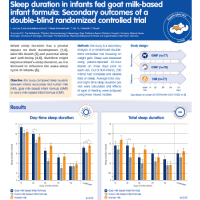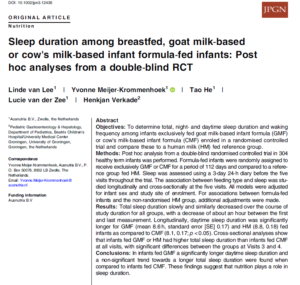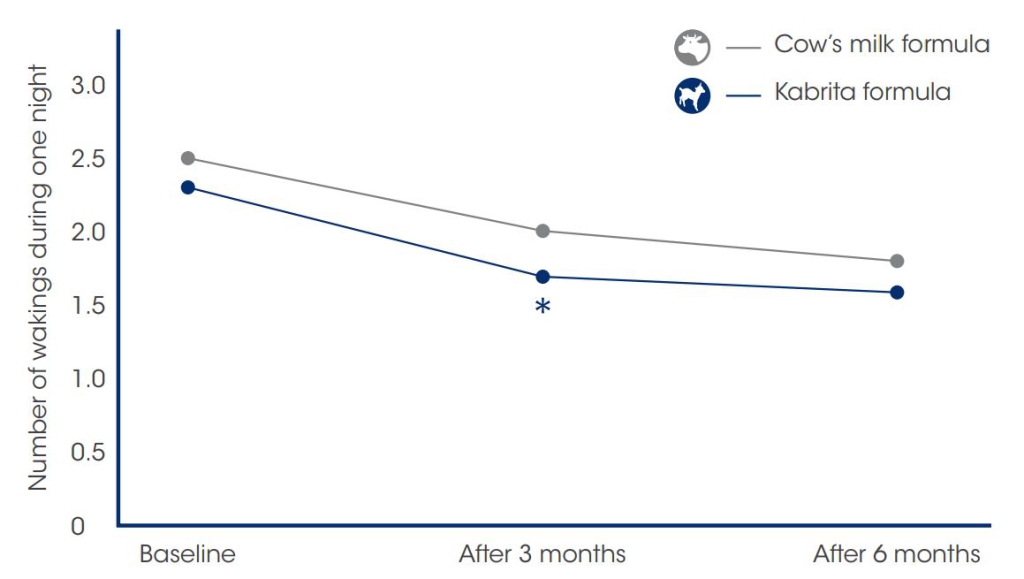
Kabrita supports adequate sleep in infants
Infant sleep duration has an important impact on infants’ development and later-life health.1-3 For example, studies demonstrate a link between short sleep duration and weight gain and obesity in young children. In addition, sleep also plays a critical role in learning and memory, emotional regulation and related brain structure development.4 Therefore, adequate sleep is an important factor supporting healthy development in infants. Especially for new–borns, the total sleep duration per 24 hours is high, and this slowly decreases when the child becomes older.4 Besides a range of behavioural factors, the nutritional composition of what infants are fed can also have an impact on infant sleep duration.5,6
Results from clinical trials: sleep duration
Ausnutria conducted a double-blind randomised controlled trial to study the effect of Kabrita formula on the sleep duration of 230 infants.7 In this study, a control group was given cow’s milk formula (CMF) and a breast-fed (BF) group served as a reference during 16 weeks of intervention. Healthy term infants aged up to 14 days old were recruited from 25 European study centres. The results showed that day-time sleep in infants fed Kabrita was comparable to that in the breast-fed group and a statistically significant 30 minutes longer than that in the CMF group (p=0.03). When analysing the separate study visits, a trend was visible towards longer total sleep duration per visit in infants fed Kabrita in comparison with infants fed CMF, with a significant difference at day 28 (mean difference 0.60, 95% CI 0.03-1.18) of the intervention.
Click on the ESPGHAN poster below for more information about this study


Hanna sleep paper
Results from clinical trials: sleeping patterns
Another Ausnutria study investigated the sleeping patterns in healthy term Chinese infants.8 Waking frequency during the night and the sleep duration per 24 hours were studied after 3 and 6 months of Kabrita formula or CMF use. The infants fed Kabrita (n=103) woke up significantly less often during the night compared to the infants fed CMF (n=86) after 3 months of intervention (Kabrita: 1.7 times per night; CMF: 2.0 times per night). This might be due to improved GI comfort in infants, as GI troubles can hamper good sleep.

Conclusion
Clinical trials demonstrate that Kabrita supports adequate sleep in infants, which can stimulate healthy development.
References
- 1. Tikotzky L, G DEM, Har-Toov J, Dollberg S, Bar-Haim Y, Sadeh A. Sleep and physical growth in infants during the first 6 months. J Sleep Res 2010; 19: 103-10.
- 2. Chaput J-P, Gray CE, Poitras VJ, et al. Systematic review of the relationships between sleep duration and health indicators in the early years (0-4 years). BMC Public Health 2017; 17: 855-.
- 3. Taveras EM, Rifas-Shiman SL, Oken E, Gunderson EP, Gillman MW. Short sleep duration in infancy and risk of childhood overweight. Arch Pediatr Adolesc Med 2008; 162: 305-11.
- 4. Jiang F. Sleep and Early Brain Development. Ann Nutr Metab. 2019;75 Suppl 1:44-54
- 5. Field T. Infant sleep problems and interventions: A review. Infant Behav Dev 2017; 47: 40-53.
- 6. Schneider N, Mutungi G, Cubero J. Diet and nutrients in the modulation of infant sleep: A review of the literature. Nutr Neurosci. 2018 Apr;21(3):151-161.
- 7. Van Lee, L., et al. Sleep duration in infants fed goat milk-based infant formula: Secondary outcomes of a double-blind randomized controlled trial. Pediatric Gastroenterology and Nutrition. 74(S2):988, June 2022.
- 8. Wang J, L.X., Ma H, et al. Growth comparison of infants feed with breast milk, goat or cow milk infant formula. Journal of Pediatric Gastroenterology and Nutrition 2021. 72: p. 1181.

